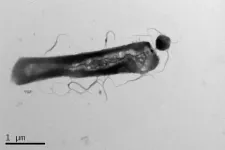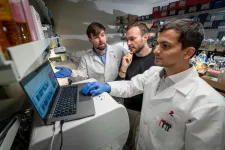(Press-News.org) A parasite that not only feeds of its host, but also makes the host change its own metabolism and thus biology. NIOZ microbiologists Su Ding and Joshua Hamm, Nicole Bale, Jaap Damsté and Anja Spang have shown this for the very first time in a specific group of parasitic microbes, so-called DPANN archea. Their study, published in Nature Communications, shows that these archaea are very ‘picky eaters’, which might drive their hosts to change the menu.
Archaea are a distinct group of microbes, similar to bacteria [see box]. The team of NIOZ microbiologists studies the so-called DPANN-archaea, that have particularly tiny cells and relatively little genetic material. The DPANN archaea are about half of all known archaea and are dependent on other microbes for their livelihood: they attach to their host and take lipids from them as building material for their membrane, their own outer layer.
Picky eaters
So far, it was thought that these parasitic archaea just eat any kind of lipids from their host to construct their membrane. But for the first time, Ding and Hamm were able to show that the parasitic archaeon Candidatus Nanohaloarchaeum antarcticus does not contain all the lipids that his host Halorubrum lacusprofundi contains, but only a selection of them. “In other words: Ca. N. antarcticus is a picky eater”, Hamm concludes.
#BOX#
Archaea, bacteria and higher organisms
Archaea are single celled organisms that were long believed to be a specific group of bacteria. Similar to bacteria, they do not have a nucleus with dna, or other organelles within their cells. As of the 1970’s, however, microbiologists no longer consider archaea bacteria, but classify them as a separate domain in all life forms. So, now we have archaea, bacteria, and eukaryotes, the latter including all animals and plants, that have a nucleus with genetic material in their cells.
#BOX#
Host responds to parasite
By analyzing the lipids in the host with or without their parasites, Ding and Hamm were also able to show that the host responds to the presence of their parasites. The hosts change their membrane, not only which types of lipids and the amounts of each type that are used, but also modifying the lipids to change how they behave. The result is an increased metabolism and a more flexible membrane that is also harder for the parasite to get through. That could have some consequences for the host, explains Hamm. ‘If the membrane of the host changes, this could have an impact on how these hosts can respond to environmental changes, in for example temperature or acidity.”
Game-changing new technique
The game-changer in this microbiological research was the design of a new analytical technique by Su Ding at NIOZ. Thus far, to analyze lipids you needed to know what lipid groups you were looking for and target them in the analysis. Ding designed a new technique in which he can look at all lipids simultaneously, also the ones you don’t know yet. “We probably wouldn’t have been able to see the changes in the lipids if we had used a classical approach, but the new approach made it straightforward,” says Hamm.
New insight
The microbiologists are very excited about these new findings. “Not only does it shed a first light on the interactions between different archaea; it gives a totally new insight in the fundamentals of microbial ecology”, Hamm says. “Especially that we’ve now demonstrated that these parasitic microbes can affect the metabolism of other microbes, which in turn could alter how they can respond to their environment. Future work is needed to determine to what extent this may impact the stability of the microbial community in changing conditions.”
About NIOZ Sea Research
The Royal Netherlands Institute for Sea Research (or NIOZ Sea Research), is the national oceanographic institute and the Netherlands’ centre of expertise for ocean, sea, coast and delta. We advance fundamental understanding of marine systems, the way they change, the role they play in climate and biodiversity, and how they may provide sustainable solutions to society in the future.
END
Archaea can be picky parasites
2024-05-01
ELSE PRESS RELEASES FROM THIS DATE:
EPA underestimates methane emissions from landfills, urban areas
2024-05-01
The Environmental Protection Agency (EPA) is underestimating methane emissions from landfills, urban areas and U.S. states, according to a new study led by researchers at the Harvard John A. Paulson School of Engineering and Applied Sciences (SEAS).
The researchers combined 2019 satellite observations with an atmospheric transport model to generate a high-resolution map of methane emissions, which was then compared to EPA estimates from the same year. The researchers found:
Methane emissions from landfills are 51% higher compared to EPA estimates
Methane emissions from 95 urban areas are 39% higher than EPA estimates
Methane emissions ...
Feathers, cognition and global consumerism in colonial Amazonia
2024-05-01
Amazonia is the home of the largest variety of birds in the world. In such a unique environment, craft cultures have flourished by translating the beauty and creativity of environmental materials like feathers into stunning pieces of art. “The Material Creativity of Affective Artifacts in the Dutch Colonial World,” a new article in Current Anthropology by Stefan Hanß of the University of Manchester, examines artisanal featherwork within the context of early modern colonialism ...
Satellite images of plants’ fluorescence can predict crop yields
2024-05-01
ITHACA, N.Y. – Cornell University researchers and collaborators have developed a new framework that allows scientists to predict crop yield without the need for enormous amounts of high-quality data – which is often scarce in developing countries, especially those facing heightened food insecurity and climate risk.
In many parts of the world, crop yields are dropping, largely due to the effects of climate change. According to a recent Cornell study, over the last four decades, for every 1 degree Celsius of warming, net farm income decreased by 66%.
Farmers in developed countries can often rely on big datasets ...
Machine learning tool identifies rare, undiagnosed immune disorders through patients’ electronic health records
2024-05-01
Researchers say a machine learning tool can identify many patients with rare, undiagnosed diseases years earlier, potentially improving outcomes and reducing cost and morbidity. The findings, led by researchers at UCLA Health, are described in Science Translational Medicine.
“Patients who have rare diseases may face prolonged delays in diagnosis and treatment, resulting in unnecessary testing, progressive illness, psychological stresses, and financial burdens,” said Manish Butte, MD, PhD, a UCLA professor in pediatrics, human genetics, and microbiology/immunology who cares for these patients in his clinic at UCLA. “Machine learning and other artificial intelligence ...
MD Anderson researcher Sharon Dent elected to prestigious National Academy of Sciences
2024-05-01
HOUSTON ― Sharon Dent, Ph.D., professor of Epigenetics and Molecular Carcinogenesis at The University of Texas MD Anderson Cancer Center, has been elected to the National Academy of Sciences (NAS). Dent is a global leader in the field of chromatin research whose foundational work has helped define the role of chromatin in cancer growth and development.
Dent is one of 120 members and 24 international members elected this year in recognition of their distinguished and continuing achievements in original research. The NAS, established in 1863 by President Abraham Lincoln, is a private, nonprofit society of distinguished scholars engaged in scientific and engineering research.
With ...
Nonmotor seizures may be missed in children, teens
2024-05-01
EMBARGOED FOR RELEASE UNTIL 4 P.M. ET, WEDNESDAY, MAY 1, 2024
MINNEAPOLIS – Children and teens may experience nonmotor seizures for months or years before being seen in an emergency department for a more obvious seizure that includes convulsions, according to a study published in the May 1, 2024, online issue of Neurology®, the medical journal of the American Academy of Neurology. Even then, the history of nonmotor seizures may not be recognized.
“Early diagnosis of epilepsy is of the utmost importance because epileptic seizures can lead to injury and even death,” said study author Jacqueline French, MD, of NYU Grossman School of Medicine ...
Emergency departments frequently miss signs of epilepsy in children
2024-05-01
A subtle type of seizure goes undetected two thirds of the time in pediatric emergency departments, a new study shows.
The work focuses on “nonmotor” seizures, which cause children to “zone out” and stare into space or fidget. They may also feel sudden changes in emotions, thoughts, or sensations, as opposed to motor seizures, which cause muscles to move in abrupt, jerking motions.
According to the authors, improving recognition of nonmotor seizures may speed up the diagnosis and treatment of epilepsy in children, ...
Unraveling the roles of non-coding DNA explains childhood cancer’s resistance to chemotherapy
2024-05-01
(MEMPHIS, Tenn. – May 01, 2024) St. Jude Children’s Research Hospital scientists have identified specific DNA variants in the non-coding regions of the genome contributing to chemotherapy resistance in acute lymphoblastic leukemia (ALL). The results guided the team to unravel the mechanism behind a previously unknown contributor to therapeutic resistance. The discovery was enabled by combining new technologies to overcome previous limitations in understanding the non-coding genome, which could be adapted to other ...
Marshall University announces new clinical trial studying the effect of ACL reconstruction on return to play in sports
2024-05-01
HUNTINGTON, W.Va. – The Marshall University Joan C. Edwards School of Medicine is now accepting applicants for an observational trial focused on fertilized anterior cruciate ligament (ACL) reconstruction.
Unlike traditional ACL repairs, fertilized ACL surgery uses a biologic concentrate of the patient’s stem cells, bone marrow and autograft bone along with an internal brace with the goal of stabilizing and expediting the healing process.
“Past patients of the fertilized ACL have already shown shorter recovery times with no known additional risks to the patient,” said Chad D. Lavender, M.D., ...
New York State is vulnerable to increasing weather-driven power outages, with vulnerable people in the Bronx, Queens and other parts of New York City being disproportionately affected
2024-05-01
New York State is vulnerable to increasing weather-driven power outages, with vulnerable people in the Bronx, Queens and other parts of New York City being disproportionately affected.
####
Article URL: https://journals.plos.org/climate/article?id=10.1371/journal.pclm.0000364
Article Title: Powerless in the storm: Severe weather-driven power outages in New York State, 2017–2020
Author Countries: United States
Funding: This work was supported by the National Institute for Environmental Health Sciences (NIEHS) P30 ES009089 ...



